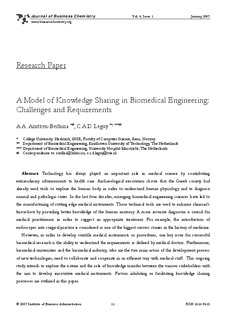A Model of Knowledge Sharing in Biomedical Engineering: Challenges and Requirements
Peer reviewed, Journal article
Permanent lenke
http://hdl.handle.net/11250/134156Utgivelsesdato
2007Metadata
Vis full innførselSamlinger
Sammendrag
Technology has always played an important role in medical science by contributing extraordinary advancements to health care. Archaeological excavation shows that the Greek society had already used tools to explore the human body in order to understand human physiology and to diagnose normal and pathologic states. In the last four decades, emerging biomedical engineering sciences have led to the manufacturing of cutting edge medical instruments. Those technical tools are used to enhance clinician?s know-how by providing better knowledge of the human anatomy. A more accurate diagnostic is crucial for medical practitioners in order to suggest an appropriate treatment. For example, the introduction of endoscopes into surgical practice is considered as one of the biggest success stories in the history of medicine. However, in order to develop suitable medical instruments or procedures, one key issue for successful biomedical research is the ability to understand the requirements as defined by medical doctors. Furthermore, biomedical universities and the biomedical industry, who are the two main actors of the development process of new technologies, need to collaborate and cooperate in an efficient way with medical staff. This ongoing study intends to explore the nature and the role of knowledge transfer between the various stakeholders with the aim to develop innovative medical instruments. Factors inhibiting or facilitating knowledge sharing processes are outlined in this paper.
